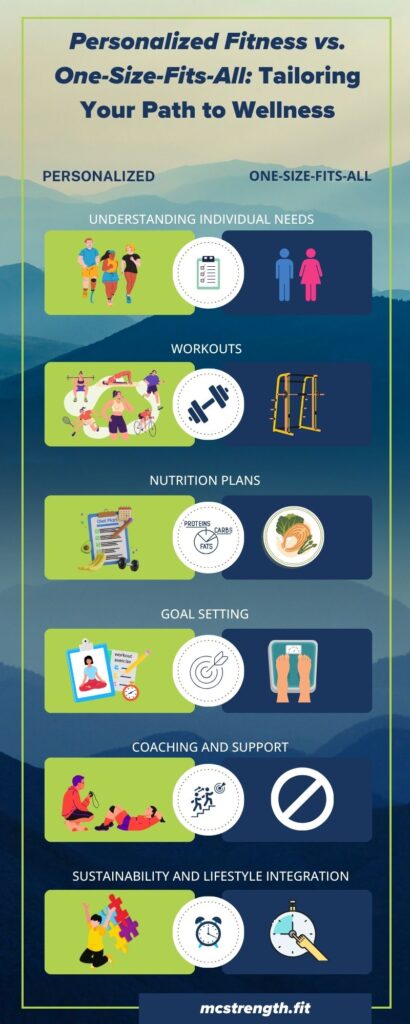Introduction

Imagine stepping into a gym for the first time, surrounded by an array of machines and weights. It’s easy to feel lost, wondering where to begin. That’s a feeling I know all too well. Years ago, as a young firefighter in Calgary, I faced my fitness challenges. Despite being in a physically demanding profession, I realized generic workouts did not align with my personal needs and goals. This experience taught me a valuable lesson: fitness is not a one-size-fits-all journey.
In this article, we’re going to explore why your fitness routine should be as unique as you are. Just as we each have our own tastes in food, music, and fashion, our bodies and fitness needs are equally diverse. A routine that works wonders for one person might not be effective, or even safe, for another.
Join us to explore issues with generic fitness programs. We will learn how to assess your body’s needs, prioritize nutrition, and easily incorporate fitness into your daily routine. We’ll talk about preparing for challenges and resistance during change, and the important role of coaching and mindset in this journey.
Remember, the path to fitness is not about achieving perfection overnight. It’s about making consistent progress, tailored to your individual needs and lifestyle. Let’s embark on this journey together, embracing the mantra, “Progress, Not Perfection.”
The Pitfalls of One-Size-Fits-All Fitness Programs
In a world where quick fixes and trendy fitness fads are rampant, it’s easy to be lured by the promise of a “universal solution” to fitness. These one-size-fits-all programs often boast impressive results with minimal effort. However, the reality is far less rosy.
First, these programs disregard individual physical differences. What might be a moderate exercise for one person could be an extreme challenge for another. This mismatch can lead to demotivation, or worse, injury. Some clients get hurt trying to follow popular programs, which sets back their progress and motivation.
Second, these programs often lack sustainability. They might promise rapid weight loss or muscle gain, but don’t teach the habits necessary for long-term health and fitness. As a result, many people find themselves in a frustrating cycle of progress and regression, never truly achieving their health goals.
Such programs can create a mental barrier to fitness. When a plan that should work doesn’t bring results, it can make people feel inadequate and disillusioned. Fitness, which should be a source of empowerment and well-being, becomes a source of stress and self-doubt.
Next, we’ll discuss how knowing your body and tailoring your nutrition and lifestyle can improve your fitness journey.
Understanding Your Unique Body and Needs
Each of us has a unique body with specific needs, limitations, and potential. Recognizing and honouring this uniqueness is the first step towards a successful fitness journey. It’s not just about the exercise itself, but about understanding your body’s response to different activities.
Listening to Your Body:
It’s crucial to pay attention to how your body feels during and after workouts. Discomfort or pain during specific exercises could show that they’re not suitable for your body. Alternatively, you might find certain exercises more enjoyable and effective, which is a clue to what works best for you.
Assessing Fitness Levels and Goals:
Fitness is not just about losing weight or building muscle; it’s about overall well-being. Your goals might include improving stamina, flexibility, or mental health. It’s important to assess where you are currently in terms of fitness and where you want to go. This assessment should be realistic and personalized.
Seeking Professional Guidance:
As a coach, I often see the difference professional guidance makes. A fitness professional can help assess your fitness level, identify your goals, and design a fitness routine that’s tailored to you. This includes exercise routines, recovery periods, and exercises to avoid based on injuries or limitations.
Remember, the goal is not to fit into a predetermined program, but to create a program that fits you. Your fitness journey should be as unique as your fingerprint—distinctively yours.

The Role of Personalized Nutrition
While exercise is a key component of fitness, nutrition plays an equally vital role. Just as we customize workout routines, our diet also needs to be tailored to our individual bodies and fitness goals. The interplay between nutrition and exercise is a dance where both partners must be in sync.
Understanding Nutritional Needs:
Each person’s nutritional requirements vary based on factors like age, gender, activity level, and health goals. Goals determine dietary needs. Those aiming for muscle gain need more protein, while those focusing on endurance sports require more carbohydrates. Acknowledging and catering to these differences is crucial.
The Myth of Diet Fads:
Just like with fitness programs, there’s no shortage of trendy diets claiming miraculous results. However, these one-size-fits-all diets often overlook individual dietary needs and preferences. What works for one might be detrimental to another. For example, a high-protein diet might be effective for some but could pose risks for others with certain health conditions.
Integrating Nutrition into Your Lifestyle:
Creating a nutrition plan that complements your fitness routine and fits into your lifestyle is essential. This doesn’t mean drastic changes overnight, but gradual, sustainable shifts in eating habits. It’s about finding the balance that works for you, ensuring that your body gets the right fuel it needs to support your fitness journey.
A personalized approach to nutrition, much like a tailored fitness routine, is about making choices that suit your body and goals. It’s a journey of discovery, learning what nourishes and energizes you and what doesn’t.
Integrating Fitness into Your Lifestyle
Creating a fitness routine that aligns with your daily life is not just about scheduling time for workouts; it’s about making fitness a natural and enjoyable part of your day. The key is not to force fitness into your life, but to weave it into your existing routine that feels organic and sustainable.
Finding Your Fit:
First, it’s essential to identify types of physical activities that you genuinely enjoy. If you love being outdoors, consider hiking, running, or cycling. If you prefer social settings, group classes or team sports might be more engaging for you. When you enjoy what you’re doing, it’s easier to make it a consistent part of your life.
Realistic Scheduling of Your Fitness Routine:
It’s important to be realistic about how much time you can dedicate to a fitness routine. Over-committing can lead to burnout and demotivation. Start with what’s manageable, even if it’s just a few minutes a day. Consistency is more important than intensity.
Blending Fitness with Daily Activities:
Look for opportunities to add more physical activity to your daily routine. This can be as simple as taking the stairs instead of the elevator, going for a walk during lunch breaks, or doing short stretching exercises while watching TV.
Dealing with Setbacks:
Life is unpredictable, and there will be days when sticking to your fitness routine is challenging. It’s crucial to be kind to yourself during these times. Missing a workout or two isn’t a failure; it’s a part of life. The important thing is to get back on track as soon as you can, without guilt.
Make sure that your fitness routine is not an isolated part of your life; By integrating fitness into your lifestyle that feels natural, you create a sustainable path to health and well-being.
Overcoming Challenges and Resistance: The Role of Coaching and Mindset
Embarking on a new fitness journey is exciting, but it’s not without its challenges. Resistance to change is a natural part of the process. However, a person can transform these hurdles into stepping stones towards success with the right mindset and coaching.
Understanding Resistance:
Change, even positive change, can be uncomfortable. It’s normal to encounter mental and emotional resistance. This could manifest as procrastination, self-doubt, or a temptation to revert to old habits. Recognizing this resistance as a natural response, rather than a personal failure, is the first step in overcoming it.
The Power of Mindset:
Developing a growth mindset is crucial. This means viewing challenges as opportunities for growth, rather than insurmountable obstacles. Embrace the idea that every effort, even those that don’t yield immediate results, contributes to your overall progress.
Role of a Coach:
As a coach, I act as a guide, supporter, and accountability partner. I help clients navigate through their resistance by providing perspective, encouragement, and practical strategies. Together, we work on setting realistic goals, celebrating small victories, and staying focused on the bigger picture.
Building Resilience:
Developing resilience is key. This involves learning to bounce back from setbacks and maintaining motivation over the long term. I often remind my clients of our mantra, “Progress, Not Perfection.” It’s about consistent effort and improvement, not about being flawless.
This journey is not just about physical transformation; it’s about mental and emotional growth. The skills you gain from overcoming fitness challenges can apply to other areas of your life.
Case Studies/Success Stories
Over the years, I’ve had the privilege of working with a diverse range of clients. Each of their journeys is unique, but they all share a common thread: the transformative power of a personalized fitness routine approach. Here are a couple of stories that stand out:
Case Study 1: Overcoming the Burden of Expectations:
Meet Alex, a client who initially came to me struggling with consistency in his fitness routine. As we delved deeper, we discovered that Alex’s challenges were rooted in a broader struggle: he was trying to live up to his parents’ expectations. He had spent much of his life trying to meet these external standards, which left little room for his own desires and goals.
Together, we embarked on a journey that was as much about mental and emotional health as it was about physical fitness. We worked to shift Alex’s focus from trying to fulfil his parents’ expectations to discovering what he truly wanted for himself. This shift in perspective was a game-changer. Not only did Alex enjoy his workouts more, but he also started making choices that reflected his own values and aspirations.
Alex’s story is a powerful reminder that fitness is not just about the physical body; it’s deeply intertwined with our mental and emotional well-being. His journey towards personal fitness became a metaphor for taking control of his life and deciding based on his own needs and happiness.
Case Study 2: Regaining Momentum in a Remote Work Environment:
Consider the case of Emma, a former athlete who transitioned to a remote working role. With her new job demanding up to 14 hours a day, Emma gradually withdrew from any form of exercise. What started as a temporary pause turned into a three-year hiatus. She desired to regain her athletic form, but the challenge of starting a new fitness routine daunted her.
Our work together focused on two key aspects: progressive activity and accountability. We started with small, manageable goals, recognizing that the journey back to fitness is a marathon, not a sprint. Step by step, we gradually customized her fitness routine to the progress she was making, celebrating the wins as we went.
Accountability played a significant role in Emma’s journey. Regular check-ins and a supportive coaching relationship helped her stay on track, even on days when motivation was low. Emma regained her athletic form and gained discipline and self-confidence in other areas of her life.
Emma’s story is a testament to the fact that it’s never too late to restart your fitness journey. With the right plan and support, what seems like an insurmountable challenge can become an achievable and rewarding journey.
Conclusion: Embracing Your Unique Fitness Routine
As we’ve explored through different perspectives and stories, there’s no universal path to a fitness routine. Each journey is as unique as the individual undertaking it. The key is to find what resonates with you in terms of exercise and how it fits into your life.
Remember, a fitness routine is more than just a series of workouts or a number on a scale. It’s about building a lifestyle that supports your physical, mental, and emotional well-being. Listen to your body, overcome challenges, and be patient and persistent in your journey.
As your coach, I’m here to guide and support you through both physical and mental challenges. Together, we will navigate this path, celebrating each step forward, no matter how small.
As we part ways in this article, I leave you with our shared mantra: “Progress, Not Perfection“. Your fitness journey is about making meaningful progress, not achieving the impossible.







